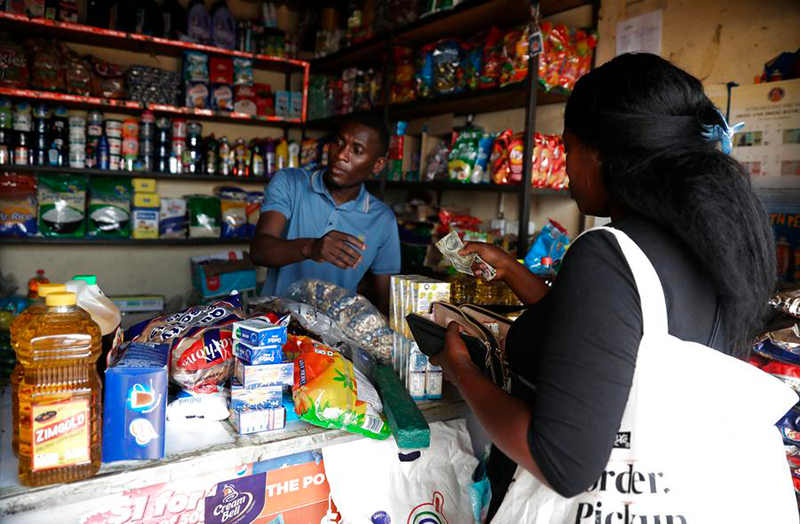- Economy
- No Comment
CURRENCY MAYHEM: Supermarkets suffer as consumers opt for tuckshops and informal stores

By Xinhua
HARARE: Chain stores have traditionally been the preferred choice for shopping, but informal stores are becoming popular among cost-aware Zimbabweans as the new gold-backed currency, the Zimbabwe Gold (ZiG), continues to depreciate against the U.S. dollar.
Zimbabwe has a multi-currency system mainly dominated by the U.S. dollar, and according to the Reserve Bank of Zimbabwe (RBZ), the central bank, around 80 percent of transactions are conducted in the greenback.
While supermarkets are mandated to use the official exchange rate, informal stores, known as tuck shops, typically operate outside regulatory frameworks, which enable them to conduct business exclusively in the stable and more predictable U.S. dollar and dodge taxes, thereby making their prices more favorable to consumers.
To cushion themselves from incurring losses by trading in the local currency, supermarkets have resorted to increasing their prices both in ZiG and U.S. dollars.
This drives consumers to informal markets, where traders offer lower prices.
In the central business district of Harare, the capital of Zimbabwe, some formal businesses have since closed shop and their place has been taken over by small retail outlets that reject or limit the use of the ZiG.
“The situation is clearly untenable and will lead to company closures if authorities do not intervene with policy measures to protect the formal retail sector,” the Retailers Association of Zimbabwe, which comprises major retailers in the country, recently said.
On Friday, the ZiG was officially trading at 24.4 units to the dollar following its devaluation by the RBZ from around 14 ZiG units per dollar. On the parallel market, however, 1 U.S. dollar fetched as much as 30 ZiG units.

Due to their use of the prevailing official exchange rate, supermarkets handle the bulk of their transactions in ZiG as it becomes cheaper for people to first exchange U.S. dollars for ZiG at the parallel market before buying in supermarkets.
At the tuck shops, the use of ZiG is mostly limited to settling small changes below 1 U.S. dollar, which is the smallest U.S. dollar denomination in circulation in Zimbabwe.
Unlike in formal shops where shoppers pick items from shelves themselves, at the tuck shops customers stay behind a counter and are served by an attendant who picks their selected items at the back of the store.
Open-air markets are also grabbing a share of the retail market. In downtown Harare, pedestrians negotiate their way on pavements occupied by traders selling all kinds of items including food, clothes and skincare products.
“Two litres of orange juice which costs around 4.50 U.S. dollars at the tuck shops, but costs over 6.50 U.S. dollars at formal supermarkets. It’s cost effective to just buy all groceries at the tuck shops,” said Harare resident Precise Jere, adding that she now only buys at informal markets due to their lower prices.
In addition, the mother of two said she mostly uses ZiG when paying for government-related services such as settling bills.
Zimbabwe has a history of currency turbulence. The country abandoned its currency, the Zimbabwean dollar, in 2009 and adopted a basket of foreign currencies dominated by the U.S. dollar following a record hyperinflation that wiped out people’s savings.
The country reintroduced another currency in 2019, but it rapidly lost value, which led to the introduction of the ZiG this year.
Officials say the new currency is being sabotaged. On Thursday, the Zimbabwe Revenue Authority (ZIMRA), the body responsible for collecting taxes and other revenue streams for the government, warned businesses evading taxes and rejecting the local currency.
“The authority is encouraging all corporate citizens and individuals to come forward and report any malpractice, particularly in relation to businesses that may be refusing to trade in local currency or those that purport to have out-of-service Point of Sale machines just as a means to force payments of goods or services in USD cash,” said ZIMRA in a statement.
Obert Nyuke, secretary for security for the War Veterans’ League in the Harare Province, urged businesses to support the local currency.
“When ZiG was introduced we expected price stability. These people are sabotaging our currency, and we are appealing to the Reserve Bank Financial Intelligence Unit to monitor what is happening on the ground,” he told Xinhua
